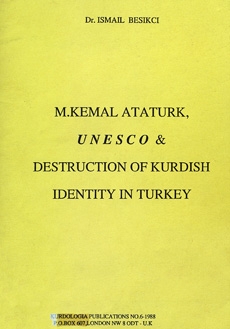| PREFACE
This letter was presented to UNESCO by the Turkish sociologist Dr.Ismail Besikci in 1981. The Ankara government reacted violently; Besikci was jailed from that time until he was released from prison in September 87, although he is still under house arrest.
Mr. Recep Maraşli, the owner of the Kurdish publishing house "Komal" in Turkey, has been sentenced to 32 years imprisonment for publishing Dr. Ismail Besikci's books and other books related to Kurds and Kurdistan.
On top of the 32 years he has been sentenced to another 4 years for defending himself in Kurdish in court. This letter was published in Turkish by "Dengê Komal" in Stokholm 1983. Then it was published in English by "Committee for Decolonization of Kurdistan" in Australia.
Now the Kurdish publishing house "Kurdologia" presents this letter again to all Kurdish people frieds in the world.
London, 1-2-1988
Jawad Mella
I have carefully read UNESCO's decision dated Oct 27, 1978 concerning the 100th anniversary of Ataturk's birth. I want to explain some of my thoughts about this decision when the 100th anniversary of Ataturk's birth is being celebrated in 1981.
Introduction
It is explained in the decision that Ataturk initiated and successfully concluded the first anti-imperialist, anti-colonialist liberation movement. It is claimed that Ataturk "Held the guiding light for the oppressed, captive nations of the East, he showed them the path of liberation". It is alleged that "Ataturk's liberation struggle was not just for the Turkish nation. His aim was to show the path to the oppressed captive nations of the East, to blaze the trail for them. He wholeheartedly wanted them to get organized to free themselves from captivity, to become free and independent. This was the primary aim of his struggle against imperialism and colonialism." It is also emphasized that Ataturk was successful in achieving this aim. It is said that all oppressed and colonized people of the world inspired by Ataturk's guiding light and knowledge have one by one achieved their freedom and independence.
UNESCO is an international institution whith the aim of ensuring the supremacy of justice and legitimacy, of freedoms necessary for a democratic way of life through education, training and cultural activities. It endeavors to promote the understanding of basic human rights and fundamental liberties, and the concept of equality among all nations. It attempts to make these concepts reign supreme in the political life of all communities. Ensuring contribution to cultural development by all citizens, of a country is one of the foremost aims of UNESCO. It expends considerable efforts in order to make these concepts reign supreme in the economic, social, political and cultural fields. Vis-a-vis the political authorities, it is important to establish civilian control and to strengthen it. enrichlment of inner lives is posible with the protection and development of human rights and human dignity against the political authorities, that is, the .Government.
UNESCO aims at protecting and developing the culture of all people. It is in the midst of reaching the source of culture and of enriching the world culture. Hence, the development and strenthening of cooperation and interdependence among peoples and nations manifests itself as a UNESCO aim which cannot be ignored.
However, the claims in UNESCO's decision concerning the 100th anniversary of Ataturk's birth are not scientific, that is, not factual. They are ideologically inspired. They are the products of an official ideology based on lies, that is, the Turkish Government's ideology. Therefore they are repudiated by tangible facts, concrete realities of life. They are rejected. No doubt, this is a serious contradiction for UNESCO whose aim is to realize the ideals of the U.N. via education, training and culture. There is benefit in explaining, in shedding light on this situation.
Throughout the world individuals have had profound impacts on the history of a region, a country or a government. They may be military or political leaders, heads of political parties or of states, or guerilla leaders etc. No doubt, history makes reliable judgments about them. For this purpose along with their sayings, their deeds are also given due consideration. Without simultaneously looking at these two aspects, there can be no reliable, no lasting, no scientific assessments.
Ataturk is one of those individuals. He has profoundly affected the history of the Middle East. He has deeply influenced the history of the Turkish nation, the Kurdish nation, the Turkish State and Middle Eastern States such as Iran, Iraq and Syria. In turn, he has influenced the world history. And no doubt, when assessing Ataturk, it is not sufficient to merely look at his expressed thoughts, writings and speeches. This is most inadequate. It is also as much incorect. Such assessment is also far from being able to explain facts and their correlations. What matters is the research into the nature of Ataturk's deeds. Hence, it is necessary to look at Ataturk's writings and sayings, that is his thoughts, along with his actions. It is necessary to evaluate them simultaneously.
Ataturk's most significant deed is the 1919-1922 war. It is the party he founded (the Republican People's Party).It is the Turkish Republic to the establishment of which he made very significant contributions. Ataturk's deeds must be looked at along with his thoughts as a whole. In this letter, I will specifically dwell on the issue of Kurdistan. That is, I will assess Ataturk's thoughts and deeds in view of the question of Kurdistan. In analyzing the nature of both his thoughts and his behavior, I will hold in my sight the reality of the Kurdish nation and Kurdistan. In short, I will assess his thoughts in view of his conduct towards Kurdistan.
| 